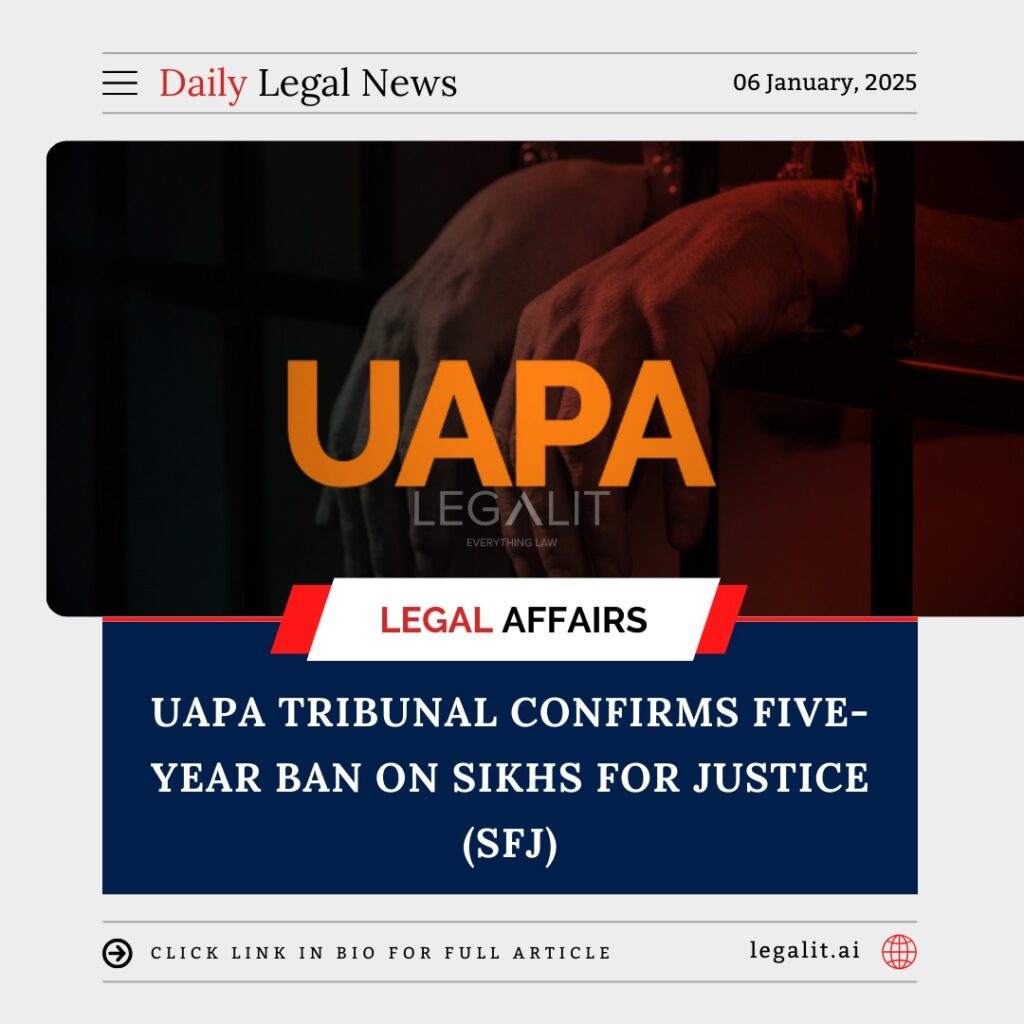
In a significant ruling, the UAPA (Unlawful Activities (Prevention) Act) Tribunal has upheld the five-year ban on the pro-Khalistan group Sikhs for Justice (SFJ). The tribunal’s decision comes after a detailed examination of the evidence presented by Indian authorities, affirming that SFJ continues to pose a threat to national security and public order. This ruling strengthens the government’s stance on combating activities linked to separatist movements and highlights the increasing scrutiny of organizations under the UAPA.
Background of the Case
Sikhs for Justice (SFJ) is a controversial organization that has been advocating for the creation of an independent Sikh state, Khalistan. The Indian government banned the group under the UAPA, citing its involvement in secessionist activities and promoting violence within India and among the Sikh diaspora. SFJ, which has been accused of orchestrating various unlawful activities, including spreading anti-national propaganda, was declared an unlawful association in 2019.
The five-year ban was imposed after the government claimed that SFJ had consistently worked against India’s sovereignty, integrity, and security. The organization has been active in various countries, including Canada, the United Kingdom, and the United States, where it has mobilized support for its cause. The UAPA Tribunal was tasked with reviewing the ban, and after considering the evidence, the tribunal upheld the government’s decision.
The Tribunal’s Ruling
The UAPA Tribunal, which is tasked with reviewing the legality of bans imposed on organizations under the Unlawful Activities (Prevention) Act, has decided to uphold the five-year ban on Sikhs for Justice. The tribunal’s decision was based on a comprehensive review of intelligence reports and other materials presented by the Indian government. The tribunal found that SFJ’s activities were in violation of India’s sovereignty and national security, particularly its efforts to incite violence and promote terrorism.
The tribunal also concluded that SFJ had continued to operate covertly, with its leaders directing activities aimed at destabilizing peace in India, including supporting terrorist activities and encouraging separatism. The group’s alleged involvement in spreading anti-India sentiment among the global Sikh community was considered a direct threat to the nation’s unity and integrity.
Implications of the Ruling
1. Strengthening National Security Measures
The tribunal’s decision underscores the government’s commitment to addressing threats posed by organizations that advocate violence and separatism. By upholding the ban, the ruling reinforces the importance of the UAPA in safeguarding India’s national security, especially against groups that seek to undermine its territorial integrity.
2. Impact on SFJ’s Operations
While the tribunal’s ruling effectively upholds the ban, SFJ’s activities, particularly in the international arena, may continue, albeit under heightened scrutiny. The group’s leadership and supporters may attempt to find new ways to circumvent the legal restrictions. However, the ruling sets a precedent for authorities to take action against any attempts to revive or further the organization’s separatist agenda.
3. Broader Consequences for Pro-Khalistan Groups
The ruling is also significant in the broader context of pro-Khalistan movements, as it highlights the Indian government’s determination to clamp down on organizations that promote separatism. This decision could encourage similar actions against other pro-Khalistan entities operating within and outside India. The ruling is likely to have a ripple effect, making it harder for such organizations to operate freely, particularly in countries with large Sikh populations.
Future Course of Action
The five-year ban, upheld by the UAPA Tribunal, remains in place, and the government will continue to monitor any activities associated with Sikhs for Justice. As part of its efforts to combat separatist movements, the Indian government may also increase its engagement with international authorities to curb SFJ’s influence abroad, particularly in countries with large Sikh diasporas.
It is likely that SFJ’s leadership will attempt to challenge the ruling in the courts, though this may be an uphill battle given the evidence presented. Additionally, the government may expand its efforts to block SFJ’s presence in social media and other digital platforms to prevent further dissemination of its anti-national activities.
Conclusion
The UAPA Tribunal’s decision to uphold the five-year ban on Sikhs for Justice is a crucial step in India’s efforts to counter separatist and extremist activities that threaten national security. The ruling sends a strong message about the government’s resolve to address organizations that incite violence and promote divisive ideologies. With this decision, India continues to prioritize its sovereignty and security, while ensuring that organizations attempting to disrupt peace and unity face legal consequences.